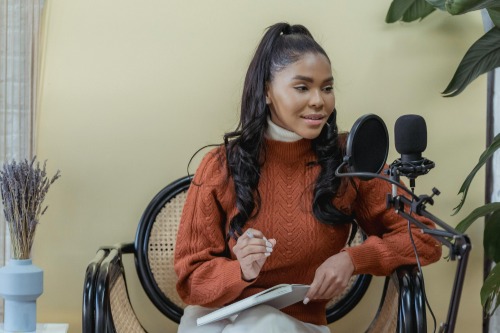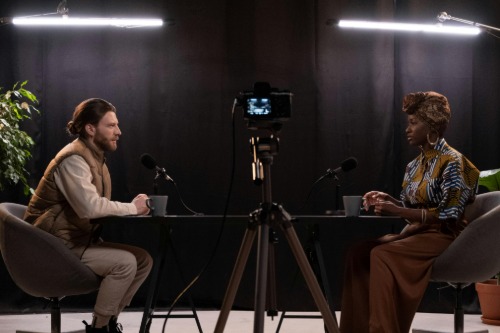The podcasting world has become a vibrant tapestry of voices, stories, and perspectives. In recent years, Black podcasts have emerged as powerful platforms reshaping the conversation around race, culture, and history. What began as a modest way for independent creators to share stories has turned into a movement—one that not only entertains but educates, empowers, and challenges long-held ideas. Let’s explore why Black podcasts are changing the game and how they’re shifting the way we understand the world around us.
Elevating Black Voices and Expanding the Narrative

Historically, Black voices have been underrepresented or misrepresented in mainstream media, whether on television, in print, or through traditional radio. Podcasts, however, offer an egalitarian space where creators control their narrative, share their stories, and speak directly to listeners. This shift is significant because it allows for unfiltered conversations that are not shaped by corporate agendas or editorial slants.
The beauty of Black podcasts lies in their diversity. From academic discussions that dive deep into Black history to light-hearted, everyday conversations that highlight Black culture, the spectrum is broad and inclusive. Take The Nod, for example, a show that explores the overlooked history and culture of Black America. Hosts Eric Eddings and Brittany Luse delve into topics that range from famous figures who never made it into the history books to the intricacies of Black fashion. They manage to weave together historical context, personal anecdotes, and humor, making these complex subjects more accessible to all audiences.
Other shows like Code Switch by NPR focus on the intersections of race, identity, and culture in America, tackling the nuances of racial bias, systemic inequality, and the day-to-day lived experiences of people of color. The unique aspect of these podcasts is their ability to take a topic that might seem abstract in an academic or journalistic setting and bring it to life with real stories, relatable insights, and expert commentary.
Creating a Space for Healing and Connection

Black podcasts aren’t just about education—they’re about connection and healing. For many in the Black community, tuning into a podcast can be a form of comfort and solidarity, a reminder that they are not alone in their experiences. Shows like Therapy Chat and The Black Girl Bravado provide safe spaces where Black people can reflect on their mental health, relationships, and personal growth. The beauty of these spaces is that they’re built by and for Black people, making them deeply personal and resonant.
In a world where racial trauma and inequality are a constant reality, Black podcasts offer moments of reprieve. They create communities where listeners can share in collective joy, laughter, and resilience. The stories are not just one-sided narratives but rather conversations that reflect the diverse experiences within the Black community—challenging stereotypes and deepening the understanding of what it truly means to be Black in America.
One such example is Black Girl Podcast, a show featuring a group of Black women discussing everything from current events to their experiences as women of color. The show not only shares stories that inspire but also makes a point to address social issues that affect Black women specifically. Whether talking about politics, beauty standards, or the pressures of the workplace, these discussions create a sense of community that resonates with listeners and offers a means of connection that’s invaluable in today’s world.
Redefining Historical and Cultural Understanding

Another transformative aspect of Black podcasts is their ability to reshape our collective understanding of history and culture. Most traditional education systems in the U.S. offer a history that’s often incomplete, omitting significant events and figures that don’t fit neatly into the mainstream narrative. But Black podcasts are filling that gap and giving their audiences the opportunity to learn and understand history from a perspective that is often left out of textbooks.
The History of Black People is a show that does exactly this. The podcast explores different time periods, movements, and influential figures in Black history, helping listeners understand how the past shapes the present. It not only recounts historical events but goes further by making connections between historical struggles and modern-day issues like racial inequality, economic disparity, and social activism.
Similarly, Black History Buff breaks down the stories of Black pioneers and trailblazers whose contributions to society have largely gone unnoticed. These podcasts offer insight into the lives of everyone from lesser-known Black inventors to influential writers, musicians, and activists who helped mold American culture. This is critical because it emphasizes the importance of learning history in a more inclusive and accurate way. By understanding these stories, listeners not only gain a richer perspective on Black culture but also develop a deeper empathy and appreciation for the diversity within the country.
Black podcasts are also instrumental in helping listeners connect with global Black experiences. Shows like Afroqueer explore what it means to be both Black and queer across different cultures. This intersectional approach is essential for broadening horizons and fostering a sense of solidarity among people of African descent worldwide.
Why It Matters
The rise of Black podcasts isn’t just a cultural shift—it’s a political and social one as well. In an era where conversations about race, justice, and identity are more relevant than ever, Black podcasts provide a platform for education, dialogue, and unity. They challenge the traditional structures of media that have often suppressed or altered Black narratives, allowing for a more authentic portrayal of Black life and history. This is significant because it shifts public consciousness and creates a more nuanced understanding of what it means to be Black in America and beyond.
By promoting stories and voices that might not have been heard otherwise, Black podcasts are making an indelible impact. They are catalysts for change, sparking conversations in families, workplaces, and communities. They encourage listeners to reflect, discuss, and most importantly, act.
In many ways, the growing influence of Black podcasts is a testament to the power of storytelling. Whether you’re learning about historical figures who changed the world or hearing a raw, honest discussion about modern-day issues, the impact is the same: they invite you to think deeper, broaden your perspective, and engage with the world in a more empathetic way. Black podcasts are more than entertainment; they’re a movement—one that’s reminding us of the richness of Black culture and the importance of seeing the world through different lenses.
